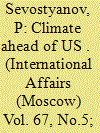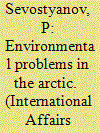| Srl | Item |
| 1 |
ID:
182904


|
|
|
|
|
| Summary/Abstract |
DEPENDING on its opportunities, Russia can vary the intensity and scope of its relations with the US, Europe, the Middle East, and other participants of international relations. But we are entering a unique, new period in world history: an energy transition based on entirely new principles. Russia, as a leader of the world hydrocarbon market, cannot and should not be left out of this process...
|
|
|
|
|
|
|
|
|
|
|
|
|
|
|
|
| 2 |
ID:
180725


|
|
|
|
|
| Summary/Abstract |
THE FIRST mentions of the Arctic date back to the 4th century BC, during the development of sea navigation.1 The origins of the word "Arctic" stem from the Greek "ἀρκτικός" (pronounced "arktikos" and meaning "northern") and άρκτος ("bear," associated with the constellation Ursa Major). It refers to the lands located under this constellation. This physical and geographical region of the Earth, with climatic conditions that make it difficult to sustain life, is an integral part of the surface of the globe. Adjacent to the North Pole, it encompasses the circumpolar expanse whose inner radius includes the seas of the Arctic Ocean, its islands and archipelagos, as well as coastal territories of the surrounding three continents: Europe, Asia and North America.
|
|
|
|
|
|
|
|
|
|
|
|
|
|
|
|